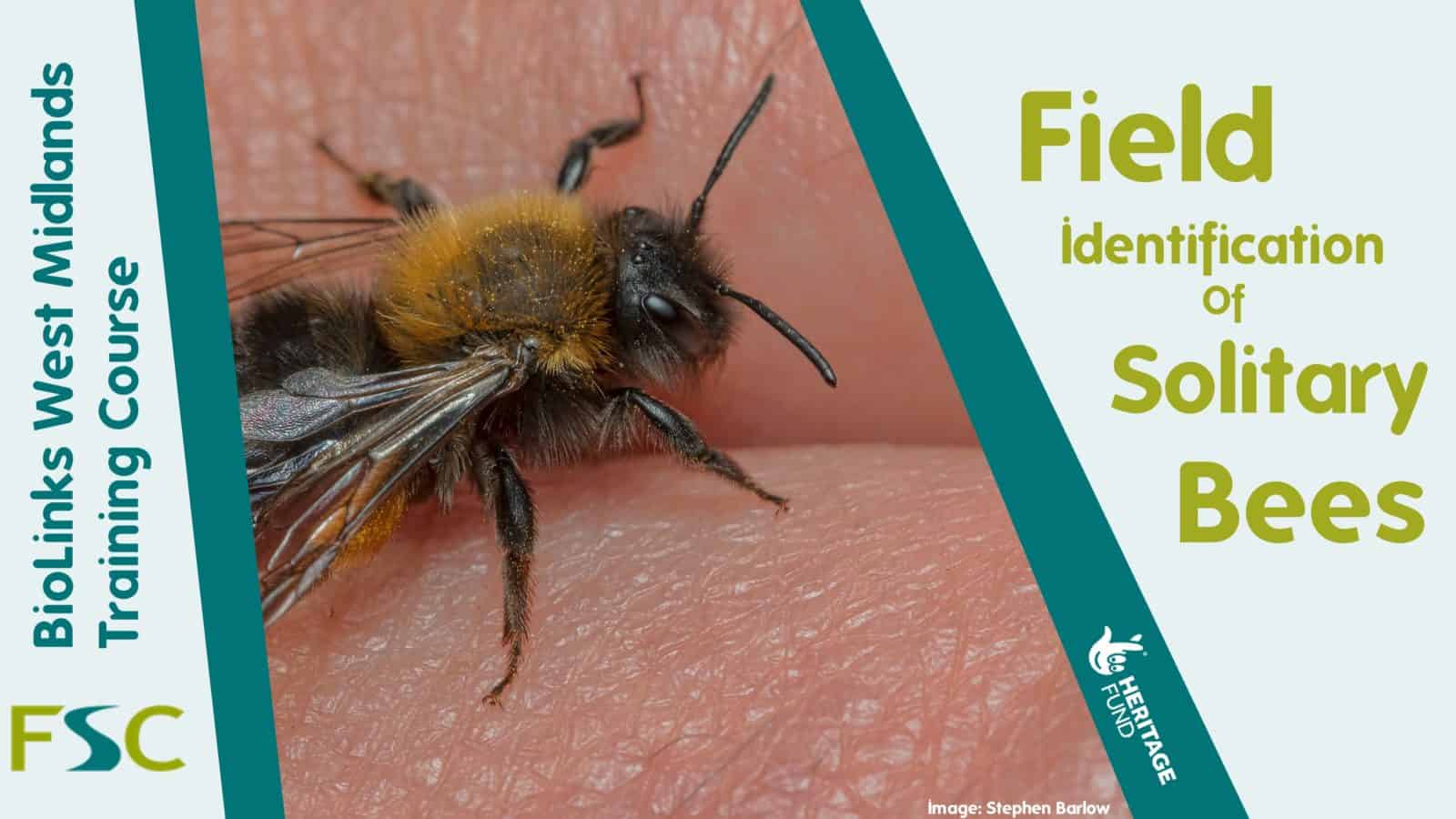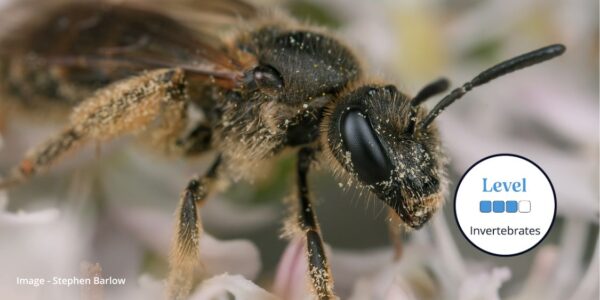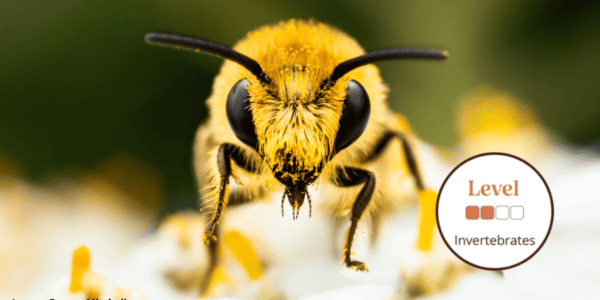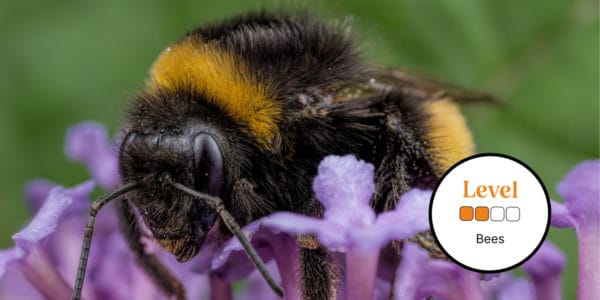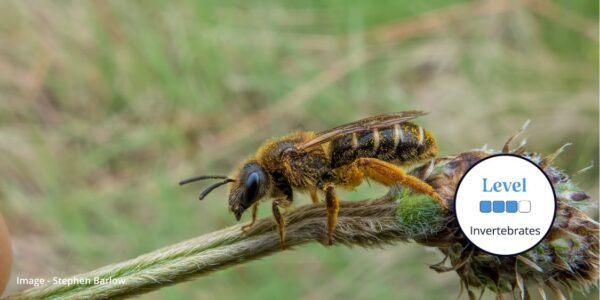There are over 270 bee species in the British Isles most of which are solitary bees – the social bees (bumblebees and honeybees) only make up about 10% of these species. Join our tutor in the field to search for, find, and discuss the identification features of a variety of UK solitary bee species that can be identified in the field.
Learn about the different families, genera and species of solitary bees and how to tell them apart. We will be using Field Guide to the Bees of Great Britain and Ireland by Steven Falk – copies will be available to use from our library, but please feel free to bring your own.
This course combines classroom-led learning and outside learning opportunities led by a specialist tutor to give learners the skills to be able to identify distinctive species of solitary bee in the field.
- Certificate upon course completion.
- Please email [email protected] if you have any questions.
- This course is limited to the identification of distinctive species that can be identified in the field.
This course is aimed at adults only and course attendees must be at least 18 years old in order to attend.
What will be covered during this course?
- An introduction to solitary bee classification and how their morphology and ecology are interconnected.
- Identification of distinctive species of solitary bee using a hand lens and field characters.
- Support from a specialist bee tutor when practicing field identification techniques.
- Guidance on how to submit solitary bee records.
- An introduction to FIT counts (flower-insect timed counts).
See the ‘Example Timetable’, ‘What’s Included’ and ‘Before You Attend’ sections below for more information about this course.
Course Fees
Regular Price: £75 For professionals and residents outside of the UK. Select ‘Attendee: In Person’ Sold Out
Subsidised Price: £10 Subsidised by the FSC BioLinks project for non-professionals eg. volunteers, biological recorders, wildlife gardeners, amateur naturalists and students. Available to UK residents only. Select ‘Attendee Subsidised: In Person’
Tutor: Aaron Bhambra
Aaron is an entomologist from the West Midlands who has been studying insects for several years as a pollinator specialist and insect ecologist. His main interests are with ‘urban’ invertebrates and the countless fascinating species which can be found in towns and cities across the UK.
His previous research has focussed on solitary bees, developing habitats for these beneficial and often undervalued pollinators throughout Birmingham, with the Peoples Trust for Endangered Species and the British Entomological and Natural History Society. Aaron started his love for bees with the FSC as a volunteer on their BioLinks courses, before progressing through their learning pathway into a tutoring role. Aaron joined the FSC BioLinks project team as a project officer developing and delivering online bee courses before moving on to undertake a PhD studying pollinators.
Covid Measures
In order to keep our customers and staff safe we ask that anyone attending our centres:
- wears a face covering when in shared indoor space (unless exempt).
- maintains social distancing.
- cleans their hands regularly.
- takes a Covid-19 test before they arrive.
Example Timetable
- Please arrive in time for the course to start promptly at 10:00 am.
- Refreshments will be available from 9.45 am.
- The course will end at 4:00 pm.
What's Included
- 6 hours of tuition.
- Certificate of attendance.
- Access to identification resources.
Bursaries and Subsidies
FSC BioLinks
FSC BioLinks is an exciting project for FSC in the South East and West Midlands, bringing together existing volunteers with skills in biological recording and identification, and new volunteers.
This project provides subsidised training courses, learning opportunities and digital tools focussed on invertebrate identification for anyone involved or interested in biological recording, to build and strengthen the community.
Invertebrates provide us with many useful ecosystem services, like pollination and decomposition, which we cannot survive without but their numbers are declining. Few people know how to identify or record invertebrates meaning there is a lack of data.
We are delighted to have been awarded a grant of £1.23 million from the National Lottery Heritage Fund for this project.
Before You Attend
Getting to FSC Bishops Wood
FSC Bishops Wood, Crossway Green, Stourport-on-Severn DY13 9SE
- By car from Kidderminster: (M5, A38, A449 southbound) On the M5 heading southbound coming off at junction 5, taking the third exit on the roundabout to get onto the A38. at the first roundabout take the third exit onto Kidderminster Road going straight over the next roundabout sticking to Kidderminster Road. At the second left turn to follow Doverdale Lane. Once you have come to a sign turning right onto the A449 take it until you get to the Mitre Oak pub on your left. Take the first exit on the roundabout onto Bishops Wood Lane, finally taking the first left on you will arrive at Bishops Wood Field Centre.
- By car from Worcester: (M5, A449 northbound) On the M5 heading northbound, take Junction 6 to Worcester/ Kidderminster taking the second exit heading for the A449 northbound, continuing for 9 miles. At the roundabout with the Mitre Oak pub take the first exit onto Stourport Road. Take the first left onto Bishops Wood Lane, finally taking the first left on you will arrive at Bishops Wood Field Centre.
What to bring
- Notebook and pencil
- Lunch
- Hand lens (if you have one)
Please wear suitable clothing for the weather (such as waterproofs) and suitable footwear (such as walking boots or wellies) as we will be out on site for some of the day.
This BioLinks course has aspects that will be taught outdoors with walking to field sites over uneven ground. No special preparation is required providing you are used to gentle exercise. If you have any concerns or questions about access or the activities involved, please get in touch.
Please note that this course will involve using specimens that have been killed and preserved.
There will be a member of staff with first aid training and access to a first aid kit on site. If you have special medical requirements please let us know as soon as possible so we can plan the course.
Sorry this course has ended

